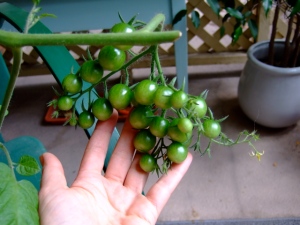Oh where do I begin?
I have an organic connection to tomatoes. I had jobs planting them, picking them, washing them, selling them. My earliest cooking experiences were with them. My geographical identity is tied to them. My fondest taste memories are about them. They challenge my writing abilities — there is just too much tomato in my soul to express the meaning of tomatoes adequately.
I learned via an e-newsletter that Boswell Books was hosting a visit from the author of Ripe: The Search for the Perfect Tomato. So I changed my plans for the weekend and made arrangements to go. I had a very particular question I wanted to ask.
The author, Arthur Allen, is a credentialed journalist. He showed up in an almost-ripe-tomato-red button-down shirt, and he had the air of studiousness about him. We all leaned forward in our chairs to listen, but he was a lean-back kind of guy. Don’t get so excited, he seemed to say without saying it. Look at the facts. Tomatoes, it turns out, have been cultivated so long that it’s hard to know what a True Tomato is. They originated in South America, where linguists have identified hundreds of words to describe them. They were slow to catch on in Europe, perhaps because their imported cousins — potatoes, corn, squash — were less perishable. When they did eventually catch on, there were controversies. I laughed when I heard that Italian “pomodoristas” were pitted against sugar-beet growers in a certain region of Italy. The controversies continue into the organic era, where some insist the only good tomato is an organically grown heirloom. But — really?
Me, I have never had a good tomato since my days living on the border of New York and Pennsylvania. Backyard gardeners and farm stand vendors in the Southern Tier got pretty darned close to my ultimate tomato memories. Near the confluence of the Chemung and Susquehanna rivers, the tomatoes grew round and beefy and sweet. I’d take two slices of hearty bread, spread them thinly with mayo, place sliced tomatoes between them, add a little salt and pepper, and have the best sandwich I could imagine. Those tomatoes lived up to the expectations I had developed growing up in New Jersey, where farm stands were accessible and, I suppose, the large consumer market made it more feasible to pick and truck them ripe. I remember working at Mr. Sage’s produce stand on Washington Valley Road, when baskets of red tomatoes would arrive, caked with dirt. They were warm from the morning sun, and we’d dump them in buckets of water to wash the soil off. Discriminating customers would ask where they were grown, and we’d always know. They were glorious specimens, sweet but not sugary, fleshy as a good steak, resonant with earth and light.
Anyway, I was dying to ask Mr. Allen, and I did:
“I have never tasted a really good tomato since living in New Jersey. Is it just my memory?”
God bless you Mr. Allen, because what you said vindicated me after all these years in the Midwest, pining for a tomato taste I worried might only be in my imagination.
“I get that question all the time,” he said. It seems that the sandy soil in New Jersey, combined with crack agricultural science (they made Campbell’s tomato soup in Camden), does create something special with tomatoes. The Rutgers tomato, for instance, will never taste as good grown in California as it does in New Jersey.
So … it was not merely my imagination.
That said, Mr. Allen and others in the audience had reports of fabulous tomatoes from Northern Florida (sandy soil), the lower Baja, California, Louisiana.
I left the book store wistful. All well and good, but would I ever experience that taste again? If you don’t live in a place where a thing is grown, you miss the confluence of season and harvest and happenstance. You don’t pass the farm stand and see that there are bushels on display, and then stop in to ask — beefsteak? Rutgers? Picked today? And get told yes, or get told no, but stop back Wednesday. You don’t have the chance to then drive home and decide you will never put the tomato in a refrigerator, but will have a tomato sandwich for dinner, and sit in the yard to eat it.
Gosh. I sure do miss that taste.
Maybe I can find it where I am now. Maybe it’s not a tomato, maybe it’s a string bean. But … string beans between two slices of bread with mayo? I guess you can’t go home again.


This message is from Mom, not Dad.
I can’t wait to send this email to Uncle Bill. He is an aficionado of New Jersey tomatoes which he needs to have whenever any of us is visiting him in the summer, or he is visiting here. He actually craves them.
Diane, did you know you can purchase tomato powder at the Wisconsin Spice House on 3rd Street? It is, quite simply, the essence of tomato–the heart of the tomato that has been squeezed and strangled and then dried. In the winter or whenever you need to remember there is such a thing as a tomato, you can sprinkle a bit of tomato powder to fortify the pallid fake abomination you’ve purchased at the grocery story and pretend it’s the real thing. Also in winter, I sometimes go to a grocery store and run my fingernail along the stem of one of those fake tomatoes–the hydroponic ones that are in bunches–and sniff and it’s almost the smell of a hot August beauty. But hark, it’s almost Real Tomato Time (even if it’s not NJ)!
I know what you mean. I just uploaded a picture of my Jersey tomatoes grown in my own Jersey soil! NO pesticides or insecticides used!Tell Uncle Bill to check my tomatoes out. Yours aren’t looking to shabby. Nice work!